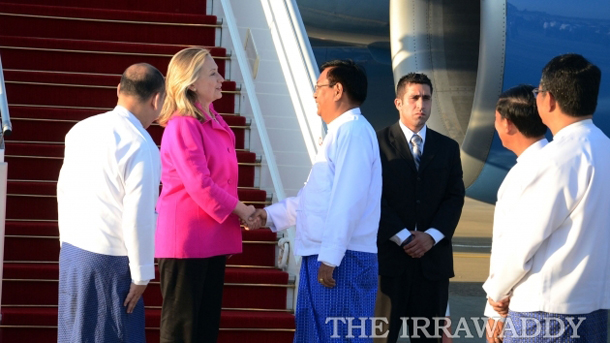WASHINGTON D.C.―The United States eased financial sanctions against Burma on Tuesday to enable private US-based groups to do charity work in the impoverished country.
The announcement by the Treasury Department is the first of a series of rewards from Washington in response to the military-dominated country’s by-elections this month that were swept by the opposition party of democracy leader Aung San Suu Kyi.
The changes are intended to support development and humanitarian assistance. Five decades of military rule turned what was once among the most prosperous nations in Southeast Asia into its poorest.
The Treasury eased restrictions on financial transactions in support of private groups working on areas such as democracy-building, health and education, sports and religious activities.
Over the past three years, the Obama administration shifted from the long-standing US policy of isolating Burma and has said it will meet action with action―gradually easing sanctions to reciprocate the government’s democratic changes.
The US also plans to send a full ambassador for the first time in more than two decades, and to ease restrictions on American investment and the export of other financial services. The US retains tough trade sanctions.
In a statement on Tuesday to celebrate Thingyan new year, US Secretary of State Hillary Clinton said Burma “has taken important steps on an historic new path toward democracy and economic development.”
“As you build a brighter future filled with new opportunities, the United States will continue to work with you to strengthen mutual understanding and trust between our two countries and peoples,” she added.
“We look forward to deepening cooperation on a wide range of issues that promote democratization and national reconciliation, from increasing access to education to expanding health care and encouraging a vibrant civil society.”
Other Western nations are also taking similar steps.
Australia said Monday it will lift financial and travel restrictions covering more than 260 people in Burma, including President Thein Sein, but will keep its arms embargo and sanctions against around 130 other people, including military officials.
“We’re easing sanctions after talking to Aung San Suu Kyi and others in the opposition, after talking to the government itself, [and] after talking to other nations,” Australian Foreign Minister Bob Carr said during a visit to the United Kingdom.
“It means that the number of people in the Burmese government subject to restrictions on their financial dealings with Australia or visas to Australia will be reduced from 392 to about 130,” he added.
Norway agreed to lift economic sanctions against Burma on Sunday, whilst maintaining its arms embargo and limitations on military cooperation.
Norwegian Foreign Minister Jonas Gahr Stoer said in a statement that Burma needs contact with the international community, economic development and international aid to hasten progress.
Next week the European Union (EU) is expected to discuss suspending its economic sanctions. Such a step by the EU would put pressure on the US to do likewise, for competitive business reasons.
Catherine Ashton, EU High Representative for Foreign Affairs and Security Policy, told the European Parliament in Strasbourg on Tuesday that Burma’s reforms had the bloc’s backing.
“Removing sanctions and increasing aid is not enough. We all recognize the vital contribution the private sector has to make. We will encourage European companies to look for opportunities in Burma and also to bring the highest standards of corporate social responsibility with them,” she said.
“In a longer perspective, the EU hopes to re-instate the Generalized System of Preferences for Myanmar, following the assessment of the International Labour Organisation.”
The Center for Strategic and International Studies, a Washington-based think tank, said the US is likely to ease investment restrictions in sectors such as tourism, agriculture, telecommunications and banking. It would retain bans on sectors such as natural resources and precious stones perceived to be closely linked to the military. Oil, natural gas and timber are major money earners for the country, also known as Myanmar.
Lifting sanctions entirely will be contingent on government consolidation of the reforms. The military is still the dominant political force in Burma, and severe rights abuses still are reported in ethnic minority regions. Despite the release of hundreds of political prisoners in recent months, others remain in detention.

















